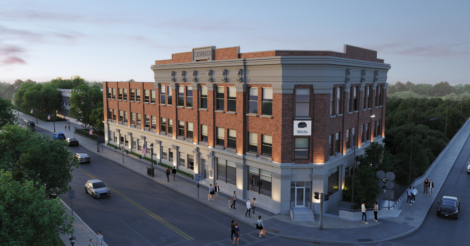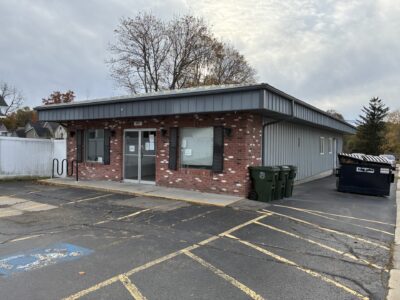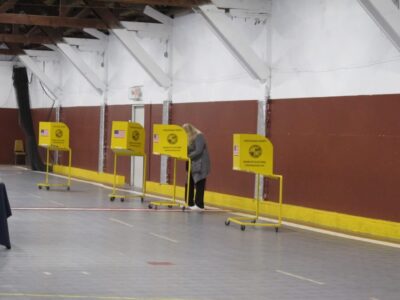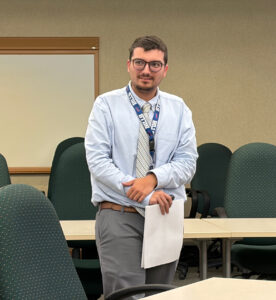Open Meeting ‘Abuse’ Comes With No Penalties

Crystal Surdyk, Jamestown development director, discusses the city’s American Rescue Plan Act economic development plan retreat in March. P-J file photo
Prior to Wednesday night’s Chautauqua County Legislature meeting, elected Republicans and Democrats went their separate ways to gather in a closed session to discuss whatever they wanted. For the record, both parties were doing nothing illegal.
Political caucusing is allowed under the New York state Open Meetings Law. Its purpose is to allow the gathered members to discuss issues or conflicts within their own parties.
It sounds harmless, but there is no public record of what actually is being said during these private sessions. Paul Wolf, president of the New York Coalition for Open Government, says the time has come for this practice to end.
“It’s really subject to tremendous abuse,” he said during the committee’s annual meeting held statewide via Zoom. “The intent was to meet and discuss party business, but who knows what gets discussed behind those closed doors. … That’s something that really needs to be changed. … Especially when the majority party can pretty much predetermine everything before the public meeting is held and the public meeting just becomes a show or a sham.”
Fifteen of Chautauqua County’s legislators are from the Republican party. It is a supermajority that has the ability to make decisions outside the public realm. Legislators can claim no public business takes place behind these doors, but only those on the inside know for sure. It is exactly why Wolf and his committee are looking to end what appears to be a questionable practice.
During the past two years — in a pandemic — open government has been far from perfect. However, there are some who have done their best to play by the rules.
In late March, Common Council members in Jamestown held a retreat at the Robert H. Jackson Center to discuss American Rescue Plan Act funding. Here, with the public able to attend, discussion centered around economic development, improving the housing stock and workforce development.
What was missing in those talks is what came to light this week. The city, in an effort to address safety concerns and emergency medical service calls, has decided to hire three new police officers and four additional firefighters.
“I’m very thankful, and certainly very appreciative, of the council’s support with bringing on four additional firefighters for the fire department,” said Deputy Fire Chief Matt Coon. “We have a dire need to address the current EMS call volume that we have in the city of Jamestown. Hiring additional personnel will allow us to deploy a second ambulance that is certainly sorely needed to try to help alleviate that burden.”
Though Jamestown’s process was open, its recent decision was not based on what happened at the retreat. A push regarding safer streets has come in recent months with 19 confirmed shootings last year along with 90 confiscated weapons as well as a crisis in responding to 9-1-1 calls.
In Fredonia, the Open Meetings Law last spring was completely disregarded. Four members, who no longer serve, decided to have a retreat that was closed to the public to discuss charter changes — a public issue no matter how dry.
Those elected officials were supported in their illegal efforts to keep the public shut out by the law firm that represents them in Webster Szanyi, LLC. Of course, the firm’s loyalty sides greatly to those elected officials — not the residents who pay the taxes.
Thanks to village government, the firm was rewarded nearly $235,000 in legal fees in 2021.
Ouch.
By the way, city of Dunkirk representatives also have issues with executive sessions that have been well documented in the OBSERVER. During one meeting in March this year regarding the pay scale of an individual, the council went into executive session for what they considered a “personnel matter.”
If you’re going by the law, that’s not a legitimate reason to shut out the public. Here are the acceptable reasons for executive sessions in New York state: matters which would imperil the public safety if disclosed; any matter which may disclose the identity of a law enforcement agent or informer information relating to current or future investigation or prosecution of a criminal offense which would imperil effective law enforcement if disclosed; discussions regarding proposed, pending or current litigation; collective negotiations pursuant to article 14 of the civil service law; the medical, financial, credit or employment history of a particular person or corporation, or matters leading to the appointment, employment, promotion, demotion, discipline, suspension, dismissal or removal of a particular person or corporation; the preparation, grading or administration of examinations; and the proposed acquisition, sale or lease of real property or the proposed acquisition of securities, or sale or exchange of securities held by the public body, but only when publicity would substantially affect the value of the real property or securities.
Citizens, however, have little power to ensure the open meeting laws with municipal or school boards are upheld other than by filing a lawsuit. This needs to be addressed moving forward, Wolf noted last week.
“In other states there are independent bodies with enforcement powers … in addressing compliance and enforcement issues,” he said. “We don’t have that in New York. That’s something we’re looking to change.”
Local boards understand there is no penalty for breaking any law dealing with open meetings. That’s why it happens more than we truly want to believe.
John D’Agostino is the editor of the OBSERVER, The Post-Journal and Times Observer in Warren, Pa. Send comments to jdagostino@observertoday.com or call 716-366-3000, ext. 253.





